Key takeaways
- Networking in the music industry thrives on genuine connections through shared stories and mutual passion.
- A well-organized musician portfolio showcases an artist’s journey, unique style, and professional evolution, serving as a critical networking tool.
- Building authentic relationships requires approachability, active listening, and effective follow-ups, including engaging on social media.
- Effective engagement with industry professionals involves curiosity, concise storytelling, and maintaining connections through appreciation messages.
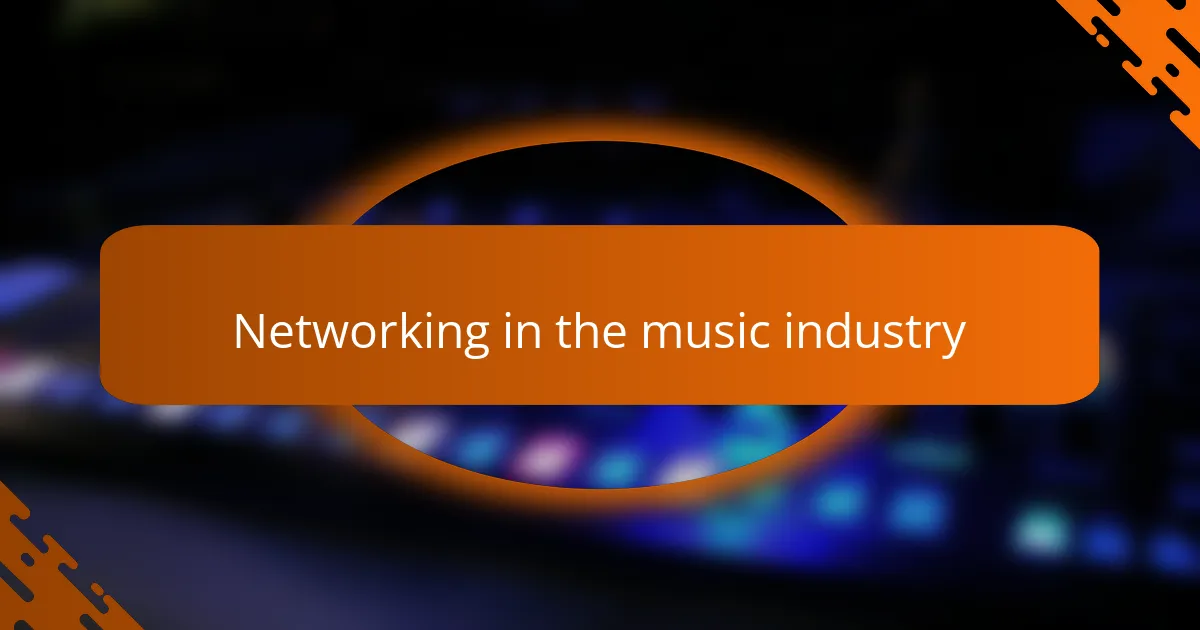
Networking in the music industry
Networking in the music industry can often feel like navigating a complex maze. I remember my first experience at a music festival, feeling overwhelmed yet excited. It made me realize that genuine connections can stem from spontaneous conversations; you never know who might become a collaborator or mentor.
Building relationships often comes down to mutual passion. Whenever I meet someone backstage or at an event, I find that sharing our stories about why we create music can break the ice. Isn’t it fascinating how a shared love for melodies can lead to opportunities?
It’s not just about handing out business cards. I’ve learned that following up with a simple message after meeting someone can set you apart. Have you ever reached out to a fellow artist after an event just to say how much you enjoyed their performance? That small gesture can resonate deeply and open doors you didn’t even know existed.
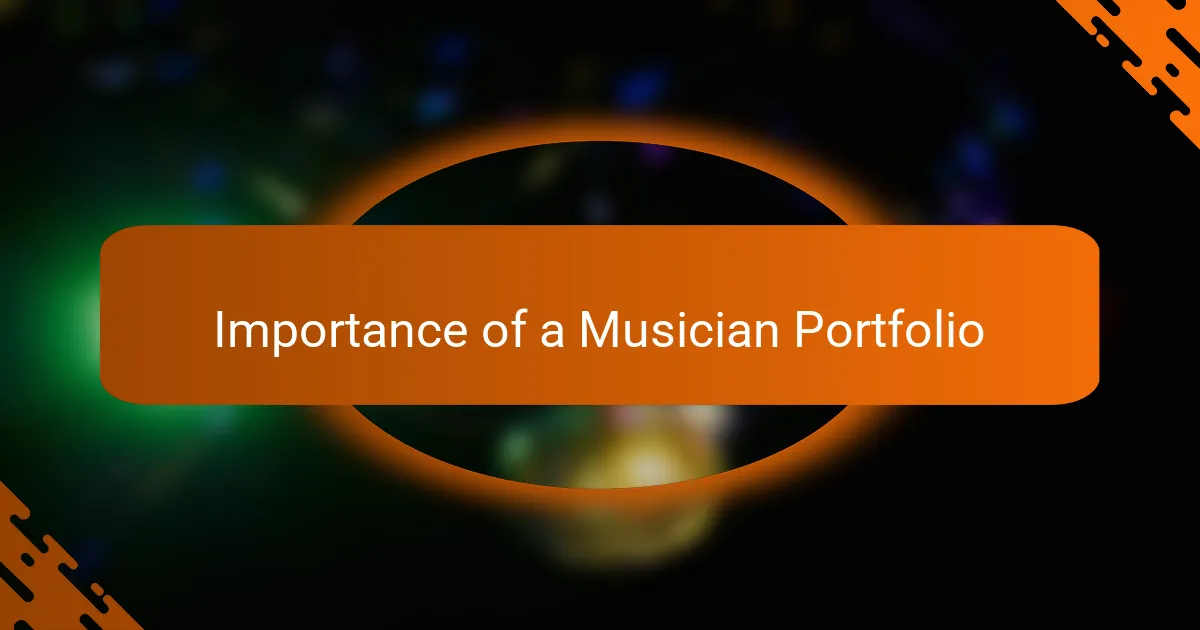
Importance of a musician portfolio
A musician portfolio is more than just a collection of songs; it’s a curated representation of one’s artistic journey. I remember when I first started out, I underestimated the power of having a well-organized portfolio. It wasn’t until I shared mine at a local music event that I saw how it truly captured my style and personality, opening doors I never imagined.
Having a strong portfolio not only showcases your best work but also reveals your evolution as an artist. Through my own experience, I’ve found that a well-crafted portfolio built on thoughtful selections can engage industry professionals and fans alike. It reflects dedication and professionalism, setting you apart in a competitive landscape.
Moreover, a musician’s portfolio serves as a vital networking tool. At festivals like South by Southwest, having a portfolio ready can lead to connections with influential figures in the music industry. Every time I’ve brought mine along, it sparked conversations that led to collaborations and opportunities for growth.
| Portfolio Aspect | Impact |
|---|---|
| Curated Content | Showcases your unique style and talent. |
| Professional Presentation | Creates a positive first impression and indicates seriousness. |
| Networking Tool | Facilitates meaningful connections with industry professionals. |
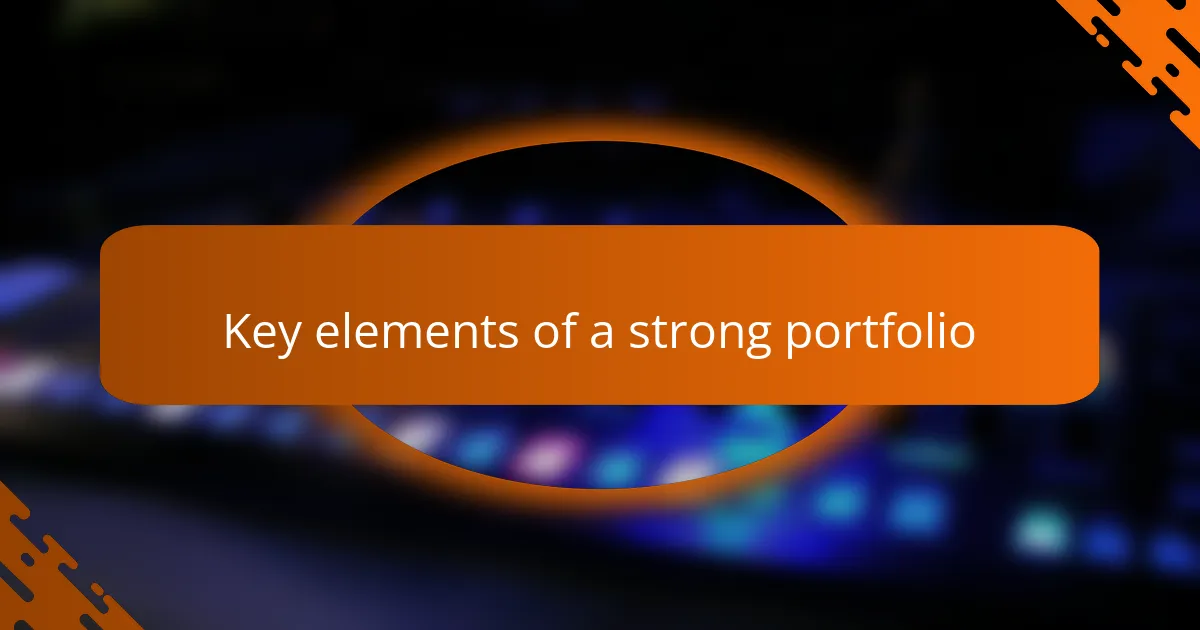
Key elements of a strong portfolio
When it comes to building a strong musician portfolio, showcasing your unique style is paramount. Each piece should reflect who you are as an artist. For instance, I remember my first portfolio—my songs, album art, and even my bio all captured my journey and passion for music. I knew it was essential that anyone looking at it could feel my energy through those elements.
Another critical element is the inclusion of high-quality media. This means professional recordings and striking visuals. I learned the hard way that a grainy video or poorly mixed song can misrepresent your talent. A polished portfolio not only gains attention but also respect within the industry.
Lastly, providing context is important. I always include stories behind my songs or the process of my artistic development. This not only connects with potential collaborators or fans emotionally but also sets me apart in a crowded market.
| Key Element | Description |
|---|---|
| Showcase Unique Style | Reflects personal artistry and journey. |
| High-Quality Media | Professional recordings and visuals create a polished impression. |
| Provide Context | Behind-the-scenes stories foster emotional connections with the audience. |
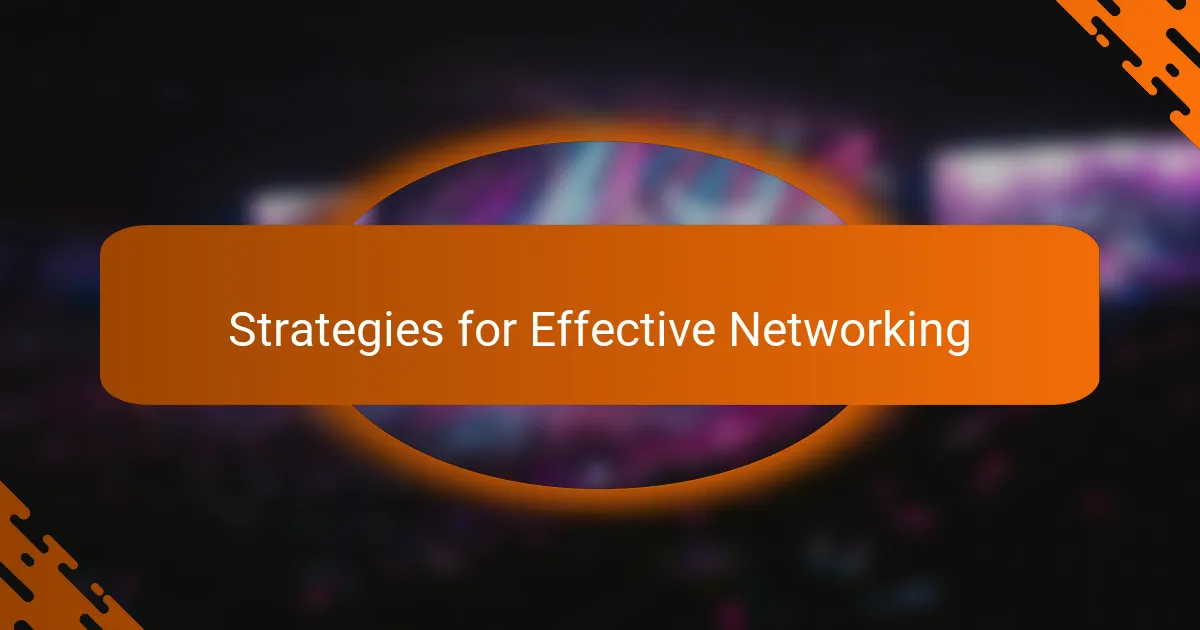
Strategies for effective networking
Building authentic relationships starts with being approachable. In my experience, a simple smile or open body language can invite conversations. Have you ever noticed how a friendly demeanor can break barriers? At events like South by Southwest, I’ve struck up meaningful connections by just being present and genuinely interested in others’ stories.
Another effective strategy is to actively listen and ask questions. When I meet someone new, I focus on understanding their journey and motivations. This approach not only shows that I care but often leads to shared experiences. By asking open-ended questions, I’ve found that conversations flow more naturally, fostering deeper connections.
Lastly, leveraging social media for follow-ups has been invaluable. After an event, I make it a point to connect on platforms like Instagram or LinkedIn. Sending a personalized message—like reminiscing about a topic we discussed—helps solidify that initial connection. It never ceases to amaze me how a digital nudge can reignite a conversation and lead to exciting opportunities down the line.
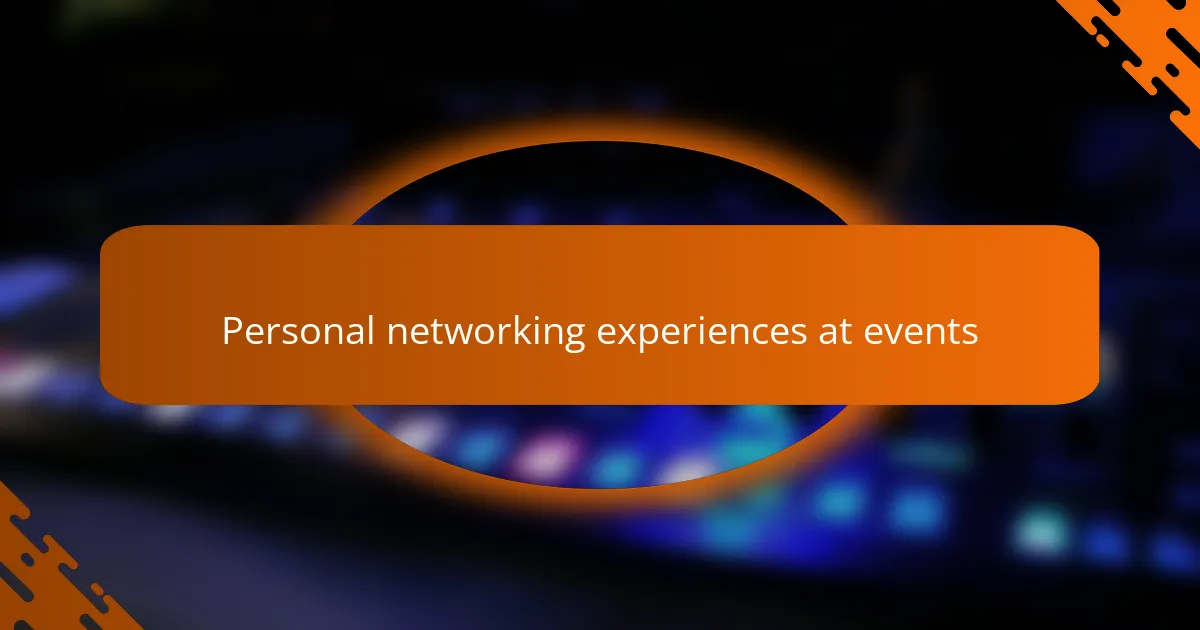
Personal networking experiences at events
At South by Southwest (SXSW), networking is more than just exchanging business cards; it’s about forming genuine connections with like-minded musicians and industry professionals. I remember my first attendee experience at SXSW, where I struck up a conversation with a fellow artist outside a showcase. That fleeting moment led to collaborative opportunities that I still cherish today.
What I’ve learned is that each interaction can lead to unexpected doors opening. For instance, meeting a producer over coffee who later invited me to perform at a local festival changed my career trajectory. It’s these spontaneous meetings that create lasting relationships, often turning acquaintances into friends.
Here’s a comparison of different networking approaches I’ve seen effectively used by musicians:
| Networking Approach | Benefits |
|---|---|
| Casual Conversations | Build authentic relationships |
| Social Media Engagement | Expand reach and visibility |
| Scheduled Meetups | Focused discussions and opportunities |
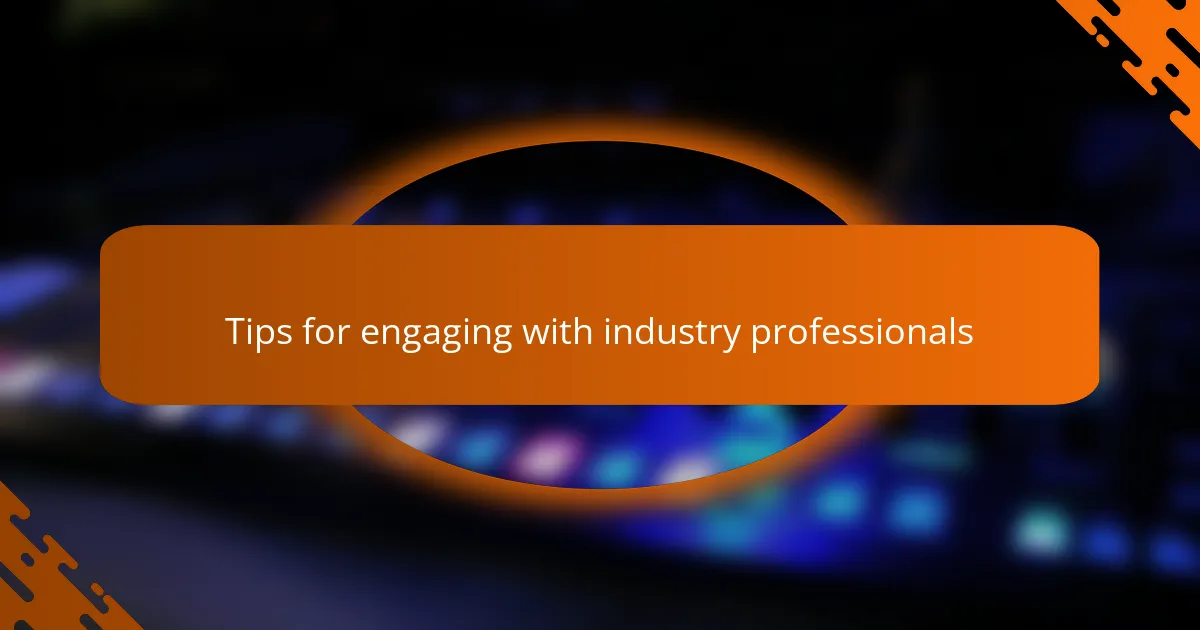
Tips for engaging with industry professionals
One effective way to engage with industry professionals is to be genuinely curious about their work. Ask open-ended questions that not only show your interest but also lead to deeper conversations. For instance, at South by Southwest, I once asked a producer about their creative process, and this sparked a discussion that lasted well over an hour. It’s those organic conversations that can lead to valuable connections.
Another tip is to share your experiences succinctly. When I introduced myself to a music label executive, I shared a brief story about my latest project and how it resonated with audiences. This not only showcased my passion but also made my approach memorable. Remember, storytelling is a powerful tool in networking; it creates emotional connections and makes you stand out in a sea of faces.
Lastly, follow up with the people you meet. A simple message expressing your appreciation for the chat can go a long way. I once followed up with a talent manager I met, and that small gesture led to an opportunity to showcase my music. Building and maintaining these relationships can open doors in the long run.
| Networking Approach | Description |
|---|---|
| Be Curious | Ask open-ended questions to spark deeper conversations. |
| Share Your Story | Provide a brief, engaging story about your work to leave a lasting impression. |
| Follow Up | Send a thank you message to build on the connection and open future opportunities. |